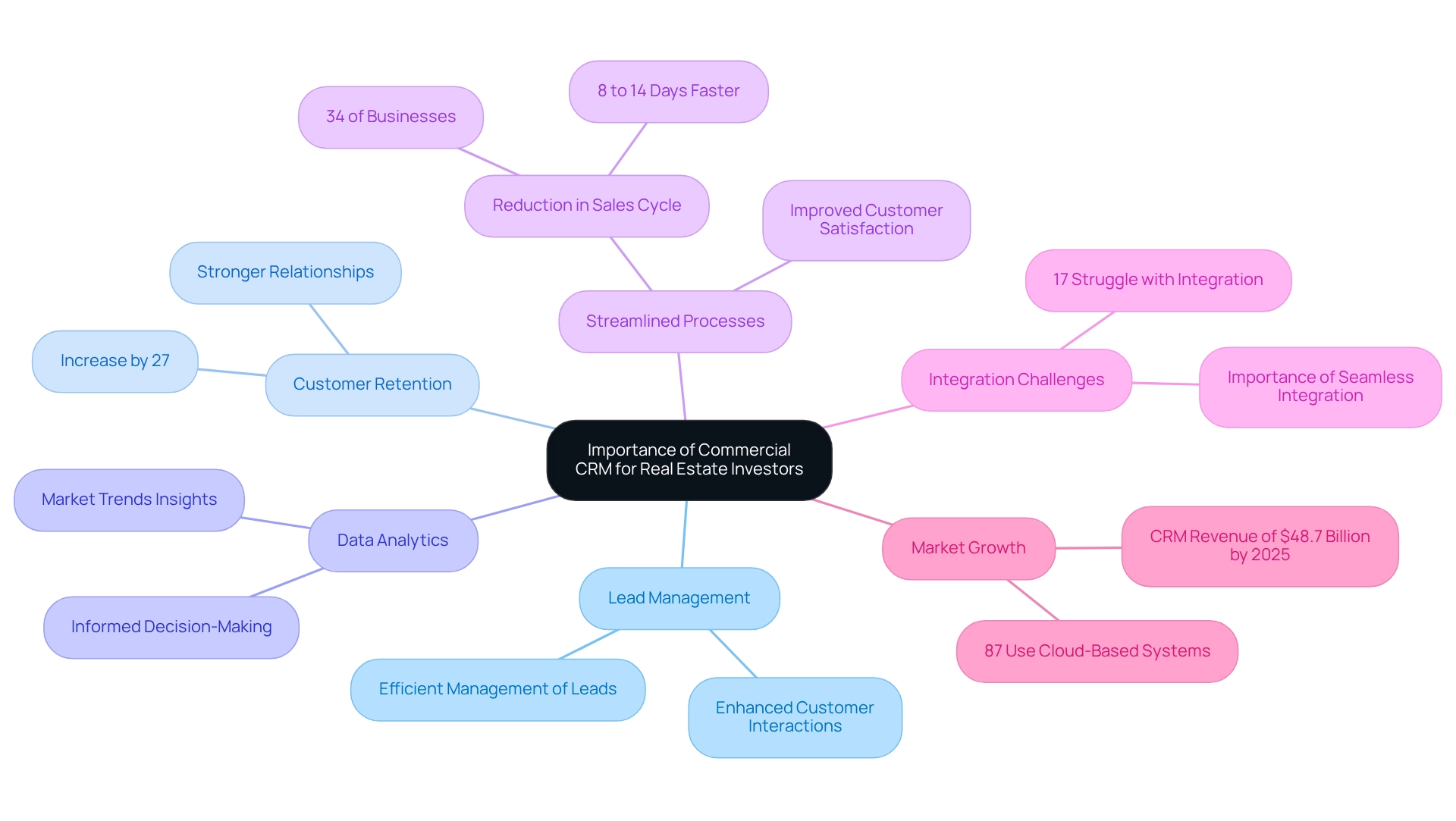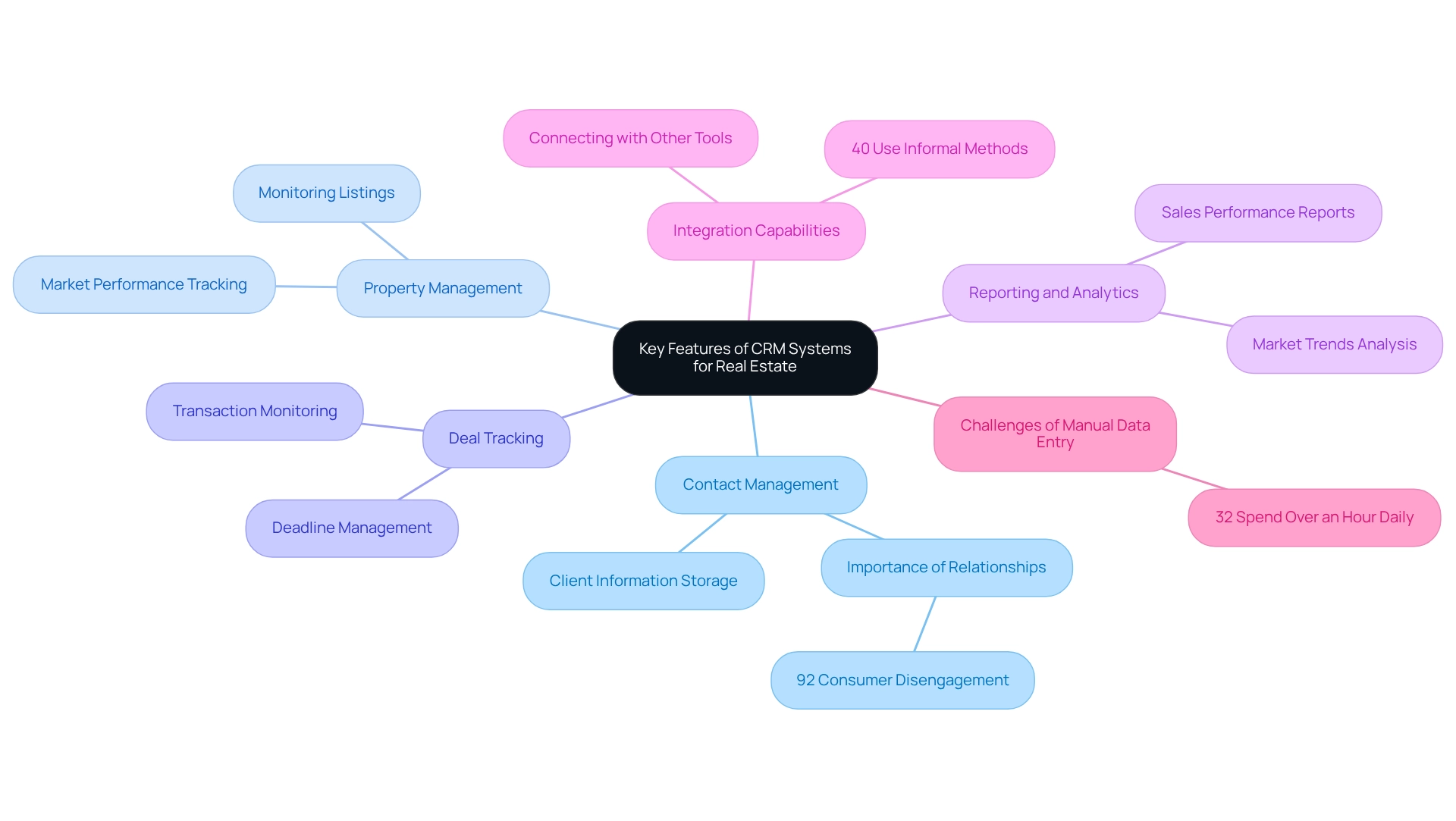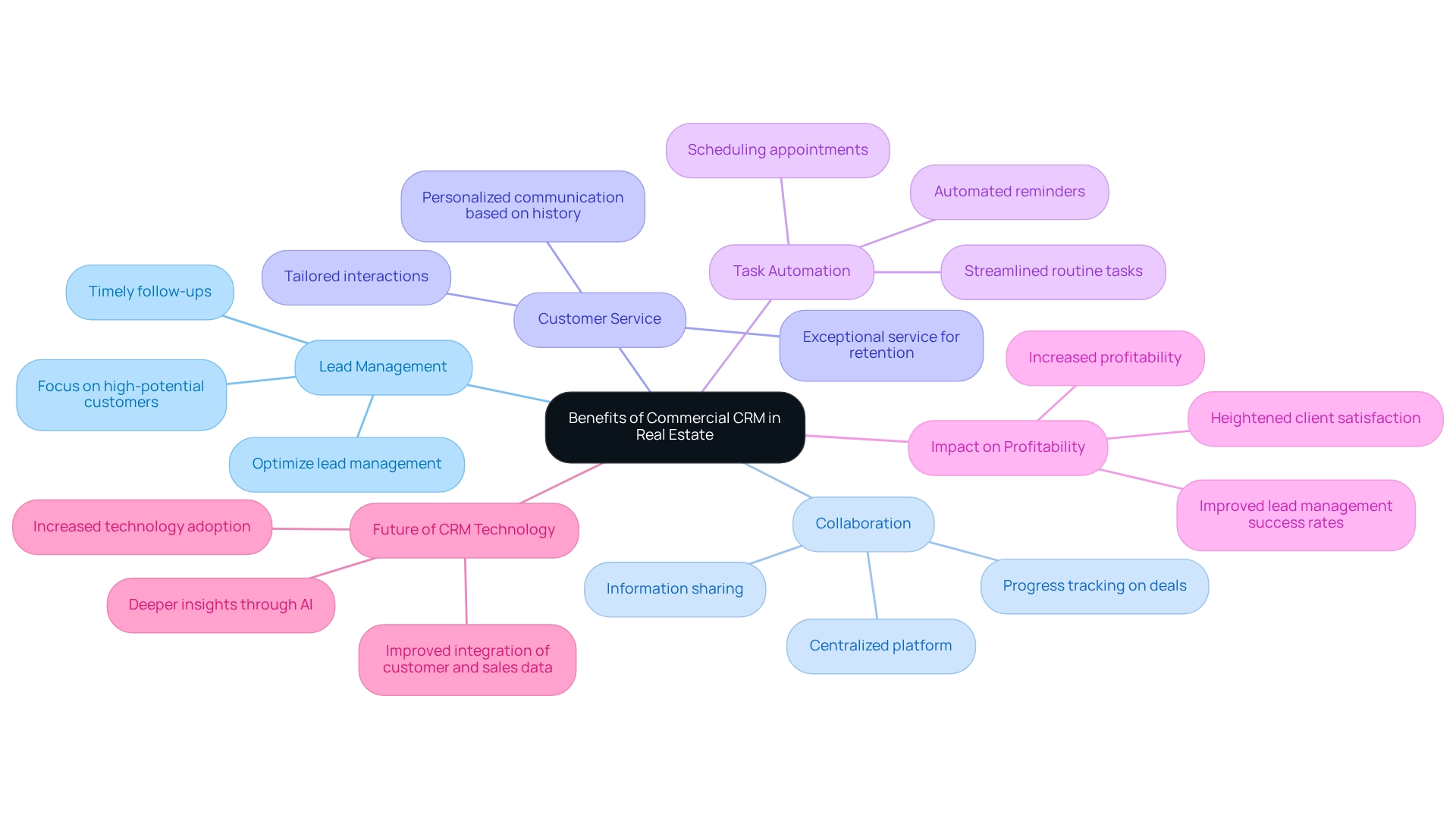Overview
Commercial CRM systems are indispensable for real estate investors, as they significantly enhance lead management, customer interactions, and transaction tracking. This ultimately drives sales growth and improves client relationships. Effective CRM implementation can lead to:
- Increased customer retention
- Accelerated sales cycles
- Superior decision-making through data analytics
These outcomes directly address the unique challenges faced in the real estate market.
Introduction
In the competitive realm of real estate, fostering robust client relationships and streamlining operations is not just beneficial; it is essential. Commercial Customer Relationship Management (CRM) systems have emerged as indispensable tools specifically designed for real estate professionals. These systems empower users to manage client interactions, property listings, and transactions with remarkable efficiency. Not only do these specialized platforms enhance communication and transaction processes, but they also leverage data analytics to provide valuable insights that can significantly influence investment strategies. As the demand for effective CRM solutions continues to escalate, grasping the unique features and benefits of these systems becomes crucial for real estate investors seeking to optimize their operations and achieve success in a rapidly evolving market.
Define Commercial CRM: Understanding Its Role in Real Estate
Commercial CRM is a specialized software solution designed to empower property professionals in managing their interactions with customers, prospects, and transactions with precision. Unlike standard CRM systems, commercial CRM solutions are specifically tailored to meet the unique demands of the property sector, facilitating the management of property listings, customer communications, and deal tracking. These systems enable property investors and agents to streamline their operations, enhance client relationships, and ultimately drive sales growth.
By centralizing information and automating processes, commercial CRM solutions are pivotal in bolstering the efficiency and success of property businesses. As the market for property commercial CRM software and management continues to evolve, it is categorized by:
- Software
- Services
- Deployment mode
- Enterprise size
- Application
- End-user
This categorization reflects the diverse needs of the industry. The growing demand for ongoing support and maintenance services underscores the necessity for regular updates and enhancements, ensuring these systems remain effective in a fast-paced market.
The Zero Flux newsletter curates 5-12 selected property insights daily, providing valuable information that underscores the importance of specialized CRM solutions. According to a confidential source, reports on CRM systems are characterized by their unique and valuable insights, further emphasizing the critical role these tools play in optimizing property operations.
Explain the Importance of Commercial CRM for Real Estate Investors
For real estate investors, having a commercial CRM is essential for several compelling reasons. Primarily, it facilitates efficient management of leads and customer interactions, ensuring that no potential opportunity is missed. Statistics indicate that CRM applications can enhance customer retention by 27%, directly affecting investors' strategies by cultivating stronger relationships and repeat business. Additionally, these systems harness data analytics to provide valuable insights, enabling investors to make informed decisions based on current market trends and client preferences.
A well-implemented CRM not only enhances communication with stakeholders but also streamlines transaction processes, significantly improving overall customer satisfaction. Case studies indicate that 34% of businesses experience a reduction in their average sales cycle by 8 to 14 days when utilizing CRM systems, enhancing sales efficiency and productivity. This shortened sales cycle allows investors to close deals faster, positively influencing their investment outcomes.
Moreover, with 87% of businesses employing cloud-based CRM solutions, the accessibility and integration of these tools become even more critical. However, it is noteworthy that 17% of users struggle with tool integration, highlighting the importance of selecting a CRM that aligns with existing systems. Investors should consider solutions that offer seamless integration capabilities to mitigate these challenges. By leveraging a commercial CRM, investors can optimize their operations, alleviate administrative burdens, and concentrate on strategic growth, ultimately enhancing their decision-making capabilities and positively impacting their investment outcomes. Furthermore, the CRM software market is expected to attain $48.7 billion in revenue by 2025, underscoring the increasing importance of these systems in the property sector.

Identify Key Features of Commercial CRM Systems for Real Estate
Key features of commercial CRM systems for real estate are crucial in enhancing operational efficiency and responsiveness to market dynamics. These features include:
- Contact Management: Effectively storing and managing client information, including contact details, preferences, and interaction history, is vital for maintaining strong client relationships. Notably, 92% of consumers indicate they would completely disengage with a company after two or three negative experiences, underscoring the importance of effective customer management.
- Property Management: Monitoring property listings, managing detailed information about each property, and tracking market performance enable informed decision-making.
- Deal Tracking: Keeping a close eye on ongoing transactions, deadlines, and critical milestones ensures timely follow-ups and successful deal closures.
- Reporting and Analytics: Generating insightful reports on sales performance, customer interactions, and market trends is essential for strategic planning and identifying growth opportunities.
- Integration Capabilities: Seamlessly connecting with other tools and platforms, such as email marketing software and financial systems, streamlines workflows and enhances overall efficiency. It is noteworthy that 40% of salespeople still save client information informally using spreadsheets and email applications, highlighting the necessity of adopting commercial CRM systems.
Together, these commercial CRM functionalities empower property professionals to manage their operations more efficiently. Furthermore, a significant 32% of sales professionals report spending over an hour daily on manual data entry, presenting a considerable barrier to effective CRM utilization. Addressing these challenges is crucial for improving CRM efficiency and maximizing the benefits of CRM systems. As the CRM software market continues to expand, with anticipated earnings reaching $48.7 billion in 2025, incorporating sophisticated property management functionalities becomes increasingly vital for investors in the property sector aiming to remain competitive.

Highlight Benefits of Commercial CRM in Overcoming Real Estate Challenges
Commercial CRMs provide a multitude of advantages that empower real estate professionals to effectively navigate industry challenges. By optimizing lead management, these systems enable agents to concentrate on high-potential customers and ensure timely follow-ups—an essential strategy in a competitive market. Furthermore, CRMs promote collaboration among team members via a centralized platform that facilitates information sharing and progress tracking on deals.
In terms of customer service, CRMs enhance personalized communication by leveraging customer history and preferences, allowing agents to tailor their interactions. The automation of routine tasks—such as scheduling appointments and sending reminders—further streamlines agents' time, enabling them to focus on relationship-building and closing deals. As Walt Disney famously stated, "Do what you do so well that they will want to see it again and bring their friends," underscoring the importance of exceptional service in retaining customers and generating referrals.
The impact of CRM technology is profound; organizations that effectively leverage these tools report improved lead management success rates, which contribute to heightened client satisfaction and increased profitability. Notably, only 28% of organizations express satisfaction with their current tools for creating a centralized customer view. The adoption of advanced commercial CRM systems can bridge this gap, providing deeper insights and more powerful capabilities for managing customer relationships. Insights from the case study titled "Future of CRM Technology" suggest that the future of CRM will involve greater technology adoption and deeper insights through artificial intelligence, further enhancing the potential of these systems. Overall, implementing a commercial CRM is not merely a technological upgrade; it is a strategic initiative that can lead to enhanced efficiency and success in the dynamic real estate landscape.

Conclusion
In the fast-paced world of real estate, Commercial Customer Relationship Management (CRM) systems emerge as indispensable tools for professionals seeking to elevate their operations and client interactions. These specialized platforms not only streamline lead and transaction management but also deliver critical data analytics that shape investment strategies. With features such as contact management, property tracking, and deal oversight, Commercial CRMs empower real estate investors to optimize workflows and enhance customer satisfaction.
The significance of adopting a robust Commercial CRM cannot be overstated. These systems have been shown to boost customer retention, shorten sales cycles, and cultivate stronger relationships between agents and clients. By facilitating efficient communication and automating routine tasks, CRMs enable real estate professionals to concentrate on what truly matters—building lasting connections and closing deals. As the market for CRM solutions continues to grow, integrating advanced functionalities will be essential for maintaining a competitive edge.
Ultimately, implementing a Commercial CRM transcends mere technical enhancement; it signifies a strategic investment in the future of real estate operations. By embracing these systems, professionals position themselves to adeptly navigate industry challenges and seize emerging opportunities. As the landscape evolves, leveraging the power of Commercial CRM will be crucial for achieving sustained success and growth in the real estate sector.




